The role of an Incident Manager is critical in maintaining the stability and reliability of IT services. They are the first responders when it comes to managing and resolving unexpected IT incidents that can disrupt normal service operations.
Incident management skills encompass a range of competencies from technical expertise to strong leadership and communication abilities. These professionals must be adept at quickly diagnosing problems, coordinating with relevant teams, and managing communications with stakeholders.
Candidates can write these abilities in their resumes, but you can’t verify them without on-the-job Incident Manager skill tests.
In this post, we will explore 9 essential Incident Manager skills, 11 secondary skills and how to assess them so you can make informed hiring decisions.
Table of contents
9 fundamental Incident Manager skills and traits
The best skills for Incident Managers include Incident Analysis, Problem Solving, Communication, Technical Knowledge, Prioritization, Documentation, Stress Management, Collaboration and Monitoring Tools.
Let’s dive into the details by examining the 9 essential skills of a Incident Manager.
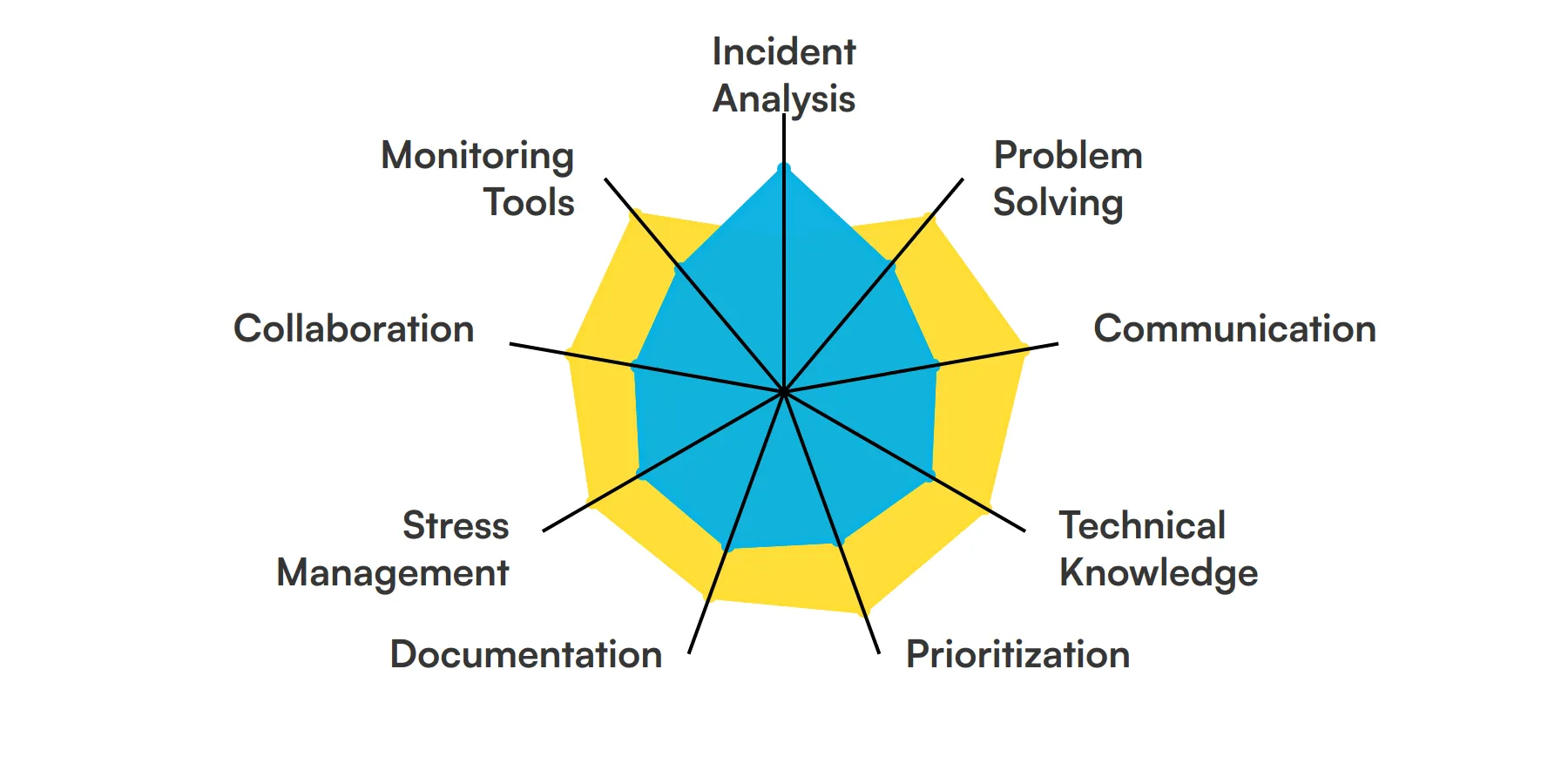
Incident Analysis
Incident Managers need to quickly analyze incidents to understand their root causes. This involves gathering data, identifying patterns, and determining the impact on systems and users. Effective incident analysis helps in formulating a swift and accurate response.
For more insights, check out our guide to writing a Incident Manager Job Description.
Problem Solving
Problem-solving skills are crucial for Incident Managers to devise effective solutions under pressure. They must think critically to resolve issues promptly, minimizing downtime and ensuring business continuity.
Communication
Clear and concise communication is key for Incident Managers. They need to relay information to technical teams, stakeholders, and sometimes customers, ensuring everyone is on the same page during an incident.
Check out our guide for a comprehensive list of interview questions.
Technical Knowledge
A strong technical background allows Incident Managers to understand the systems and technologies involved. This knowledge is essential for diagnosing issues and coordinating with technical teams to implement fixes.
Prioritization
Incident Managers must prioritize tasks effectively to address the most critical issues first. This skill ensures that resources are allocated efficiently and that high-impact incidents are resolved promptly.
Documentation
Accurate documentation of incidents, actions taken, and resolutions is vital. This helps in creating a knowledge base for future reference and in conducting post-incident reviews to improve processes.
Stress Management
Handling incidents can be stressful, and Incident Managers need to maintain composure under pressure. Effective stress management ensures they can think clearly and make sound decisions during high-stakes situations.
Collaboration
Incident Managers often work with various teams across the organization. Strong collaboration skills help in coordinating efforts, sharing information, and ensuring a unified response to incidents.
Monitoring Tools
Proficiency with monitoring tools is essential for Incident Managers to detect and respond to incidents quickly. These tools provide real-time data and alerts, enabling proactive incident management.
11 secondary Incident Manager skills and traits
The best skills for Incident Managers include Risk Assessment, Change Management, Customer Service, Data Analysis, Project Management, Automation, Compliance, Training, Vendor Management, Budgeting and Reporting.
Let’s dive into the details by examining the 11 secondary skills of a Incident Manager.
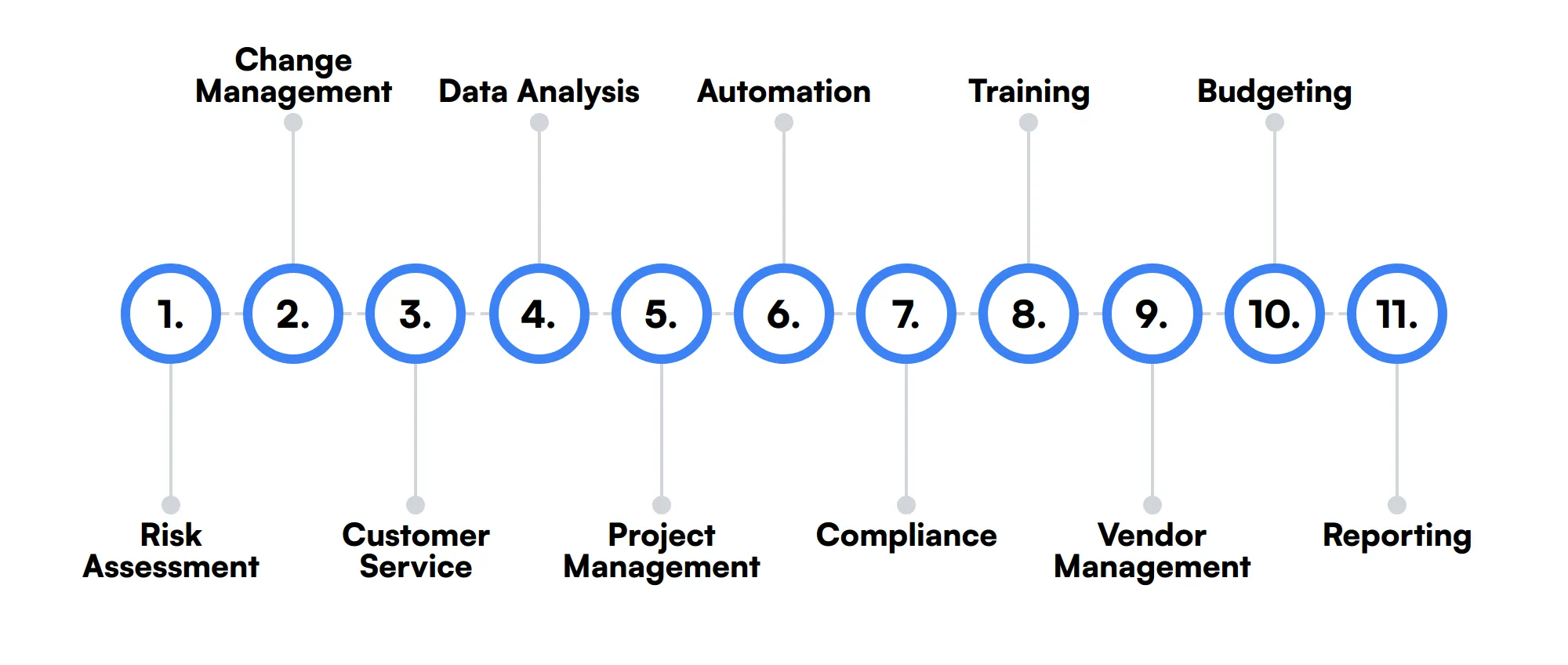
Risk Assessment
Understanding potential risks and their impact helps Incident Managers in preparing for and mitigating incidents. This skill involves evaluating the likelihood and consequences of different scenarios.
Change Management
Incident Managers often need to implement changes to prevent future incidents. Knowledge of change management processes ensures that changes are made systematically and with minimal disruption.
Customer Service
Providing excellent customer service is important, especially when incidents affect end-users. Incident Managers should be able to communicate empathetically and provide timely updates to maintain customer trust.
Data Analysis
Analyzing data from incidents can reveal trends and insights that help in preventing future issues. Incident Managers use data analysis to improve incident response strategies and system reliability.
Project Management
Managing incident resolution often involves coordinating multiple tasks and resources. Project management skills help Incident Managers keep track of progress, deadlines, and deliverables.
Automation
Knowledge of automation tools can streamline incident management processes. Incident Managers can use automation to reduce manual tasks, speed up response times, and improve accuracy.
Compliance
Understanding regulatory and compliance requirements ensures that incident management practices adhere to legal standards. This is particularly important in industries with strict data protection and privacy laws.
Training
Incident Managers may need to train team members on incident response protocols. Effective training ensures that everyone knows their roles and responsibilities during an incident.
Vendor Management
Coordinating with external vendors can be necessary during incidents involving third-party services. Incident Managers should be able to manage vendor relationships and ensure timely support.
Budgeting
Managing the budget for incident management activities ensures that resources are used efficiently. Incident Managers need to plan and allocate funds for tools, training, and other necessary expenses.
Reporting
Creating detailed reports on incidents and their resolutions helps in communicating with stakeholders and improving future responses. Incident Managers should be skilled in compiling and presenting this information clearly.
How to assess Incident Manager skills and traits
Assessing the skills and traits of an Incident Manager can be a challenging task, given the diverse range of abilities required for the role. From incident analysis and problem-solving to effective communication and technical knowledge, an Incident Manager must be adept in various areas to handle crises efficiently.
Traditional resumes and interviews often fall short in providing a comprehensive view of a candidate's capabilities. This is where skills-based assessments come into play. By leveraging tools like Adaface on-the-job skill tests, you can gain a clearer understanding of a candidate's competencies, leading to a 2x improved quality of hires and an 85% reduction in screening time.
When evaluating an Incident Manager, it's important to consider their ability to prioritize tasks, document incidents accurately, manage stress, and collaborate effectively with team members. Additionally, proficiency with monitoring tools is essential for real-time incident tracking and resolution. By focusing on these key skills, you can ensure that your Incident Manager is well-equipped to handle any situation that arises.
Let’s look at how to assess Incident Manager skills with these 6 talent assessments.
Data Analysis Test
Our Data Analysis Test assesses a candidate's ability to handle, modify, analyze, and interpret data. The test uses scenario-based MCQ questions to screen for experience with analyzing data to find possible outcomes, detect anomalies, extract meaningful insights, project estimates, and visualize data using charts and graphs.
The test evaluates skills in data modelling, business analysis fundamentals, data interpretation, and SQL. Candidates are tested on their ability to perform data operations like predictions and anomaly detection, as well as their proficiency with popular data tools like Excel.
High-scoring candidates demonstrate strong capabilities in data investigations, including correlations and ranking, and can effectively interpret and manipulate data to provide actionable insights.

Problem Solving Test
The Problem Solving Test evaluates a candidate's ability to understand instructions, analyze data, and respond to complex problems or situations. The questions are designed to get insights into their problem-solving, learning agility, and coachability.
This test covers abstract reasoning, critical thinking, deductive reasoning, inductive reasoning, pattern matching, and spatial reasoning. Candidates are challenged to navigate through logical reasoning, data interpretation, and spatial reasoning scenarios.
Successful candidates show strong analytical skills and the ability to apply logical reasoning to solve complex problems. They also demonstrate high learning agility and adaptability.
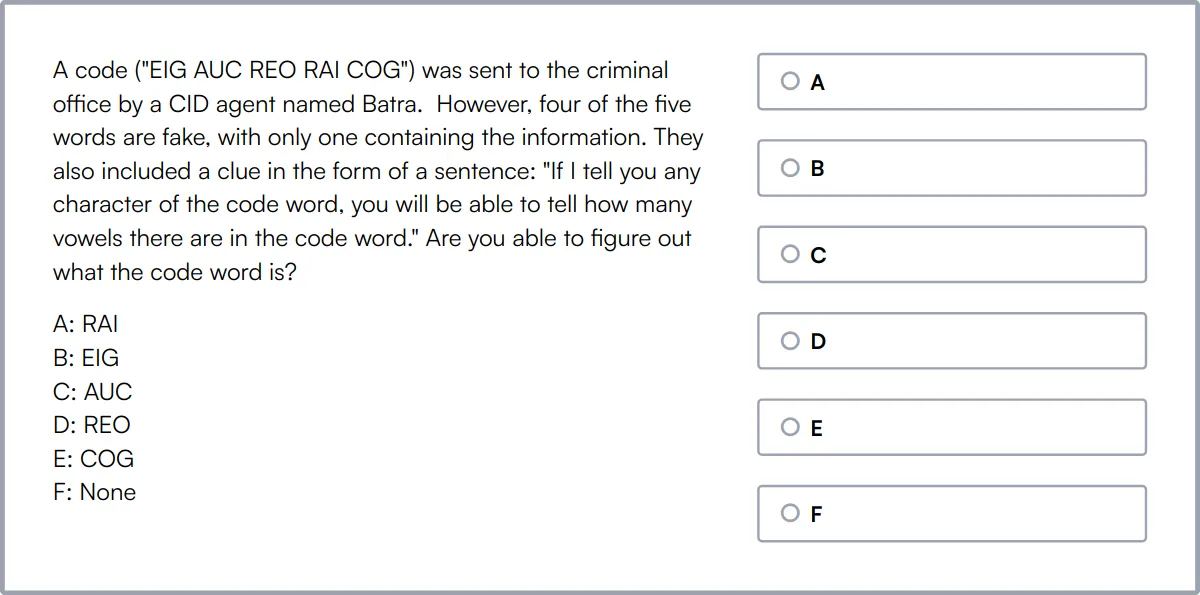
Communication Skills Test
The Communication Skills Test evaluates candidates' communication skills, including verbal and written communication, active listening, and interpersonal skills. It is designed to assess their ability to effectively communicate with customers, colleagues, and stakeholders in various professional scenarios.
The test assesses situational judgement, attention to detail, critical thinking, and verbal reasoning. Candidates are evaluated on their ability to navigate through situational judgement scenarios and demonstrate effective communication skills.
High-scoring candidates exhibit strong verbal reasoning and critical thinking skills, along with the ability to communicate clearly and effectively in various professional contexts.
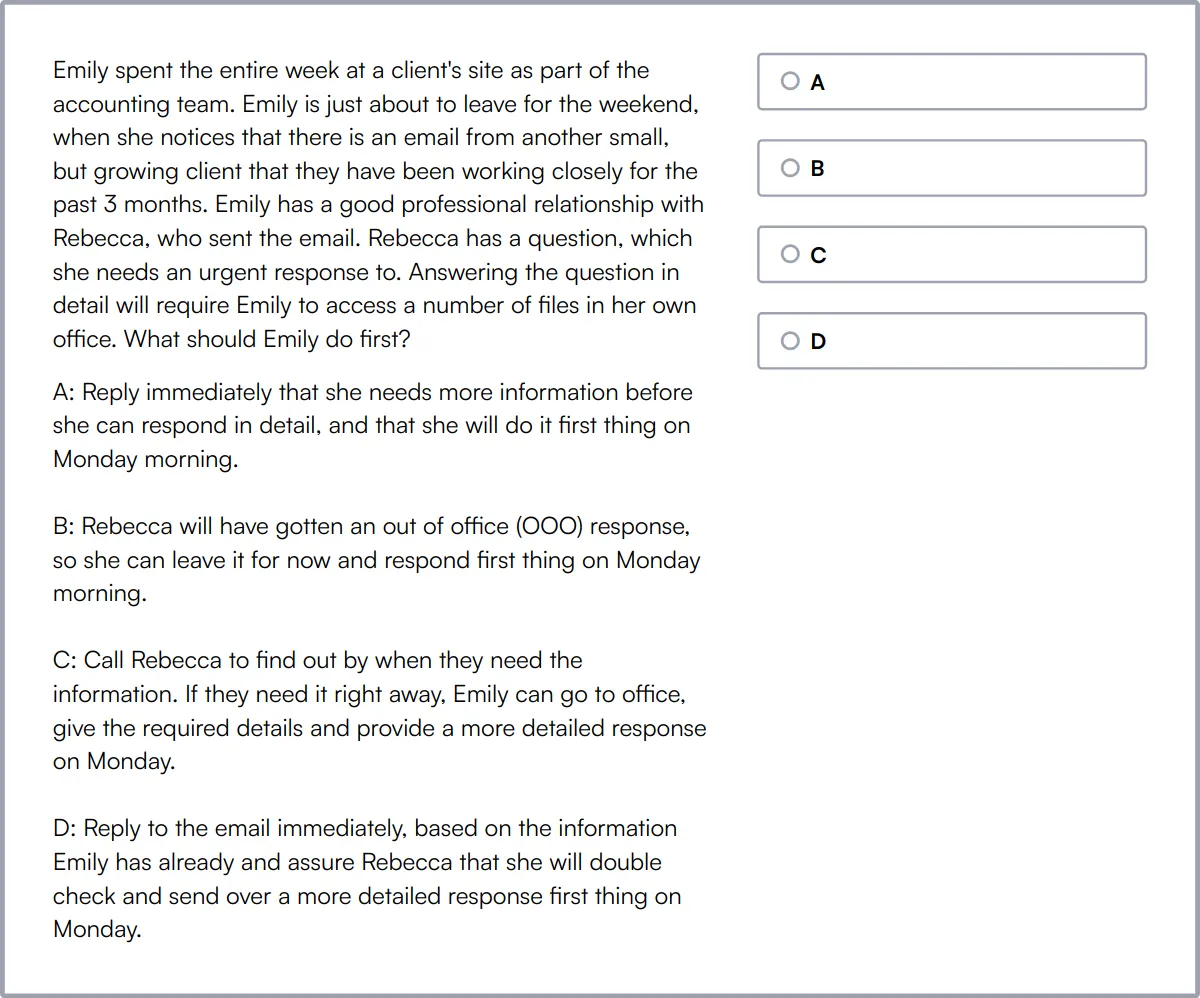
Technical Aptitude Test
The Technical Aptitude Test uses scenario-based multiple-choice questions to evaluate a candidate's general technical aptitude and problem-solving skills. The test covers topics such as basic computer concepts, programming fundamentals, data structures, time complexity, database management, networking and security, system administration, web development, and software engineering.
The test evaluates programming fundamentals, data structures, algorithm basics, and technical aptitude. Candidates are tested on their ability to apply critical thinking, logical reasoning, and analytical skills to solve complex technical problems.
Candidates who perform well demonstrate a solid understanding of technical concepts and the ability to apply their knowledge to real-world scenarios.
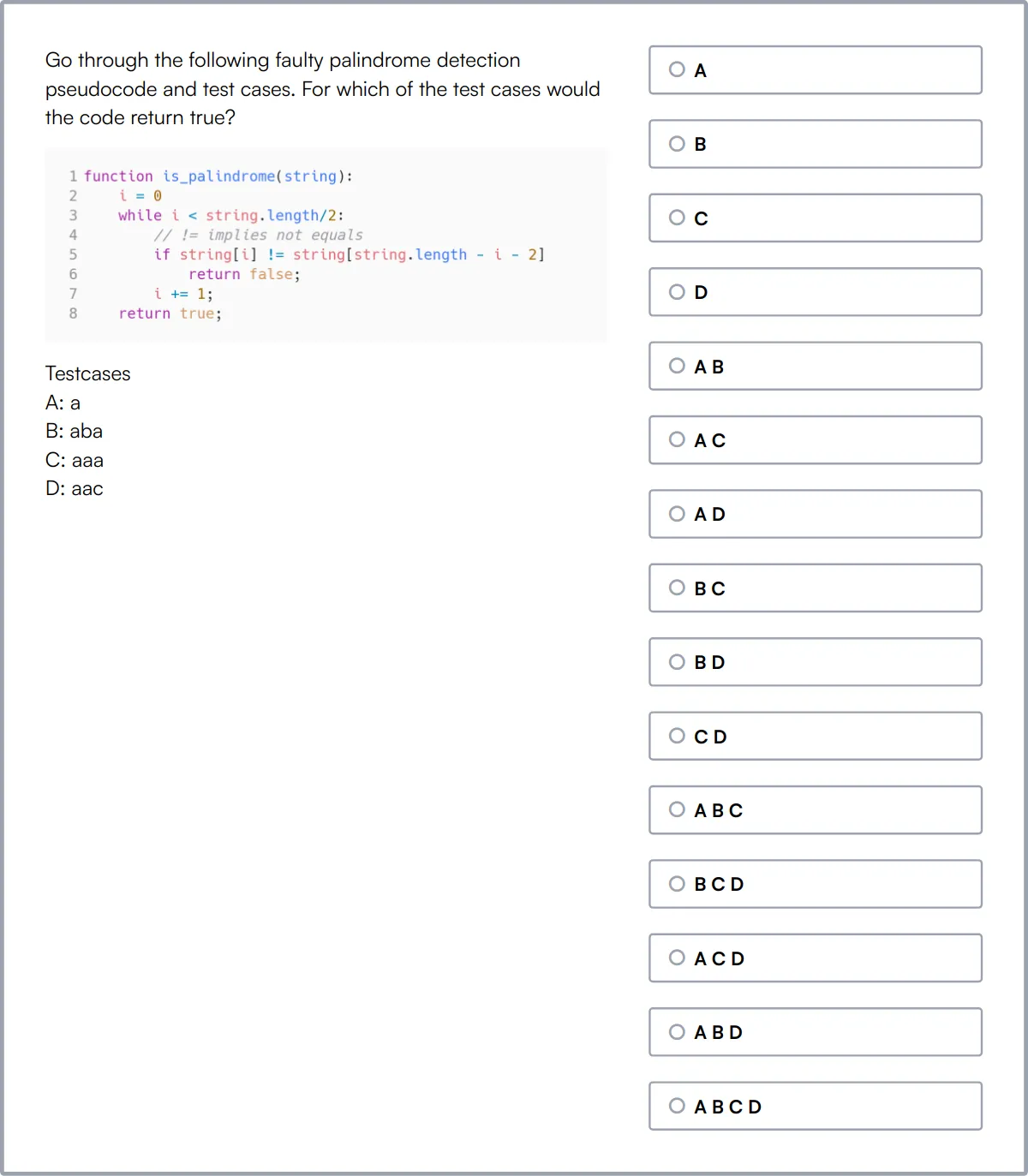
Situational Judgement Test
The Situational Judgement Test uses scenario-based questions to assess a candidate's ability to handle challenges that might come up in the workplace professionally. This pre-employment test is used by recruiters to evaluate emotional intelligence, relationship building, awareness, teamwork, and communication skills.
The test covers rating responses, most effective and least effective responses, problem solving, work management, communication skills, time management, customer service, adaptability, decision-making, and ethics and integrity. Candidates are evaluated on their ability to navigate through situational judgement scenarios and demonstrate effective problem-solving and decision-making skills.
High-scoring candidates show strong emotional intelligence, adaptability, and the ability to handle workplace challenges professionally and effectively.
English Comprehension Test
The English Comprehension Test evaluates a candidate’s ability to comprehend business-level English, understand textual information, deduce information from presented facts, and express ideas clearly in English. This test is used by recruiters for pre-employment screening of candidates for roles that require a good command over the English language.
The test assesses drawing conclusions, inferencing, attention to detail, grammar, vocabulary, reading comprehension, sentence structure, and writing skills. Candidates are tested on their ability to understand and interpret textual information and express their ideas clearly.
Candidates who perform well demonstrate strong reading comprehension, vocabulary, and writing skills, along with the ability to deduce information and draw accurate conclusions from textual data.
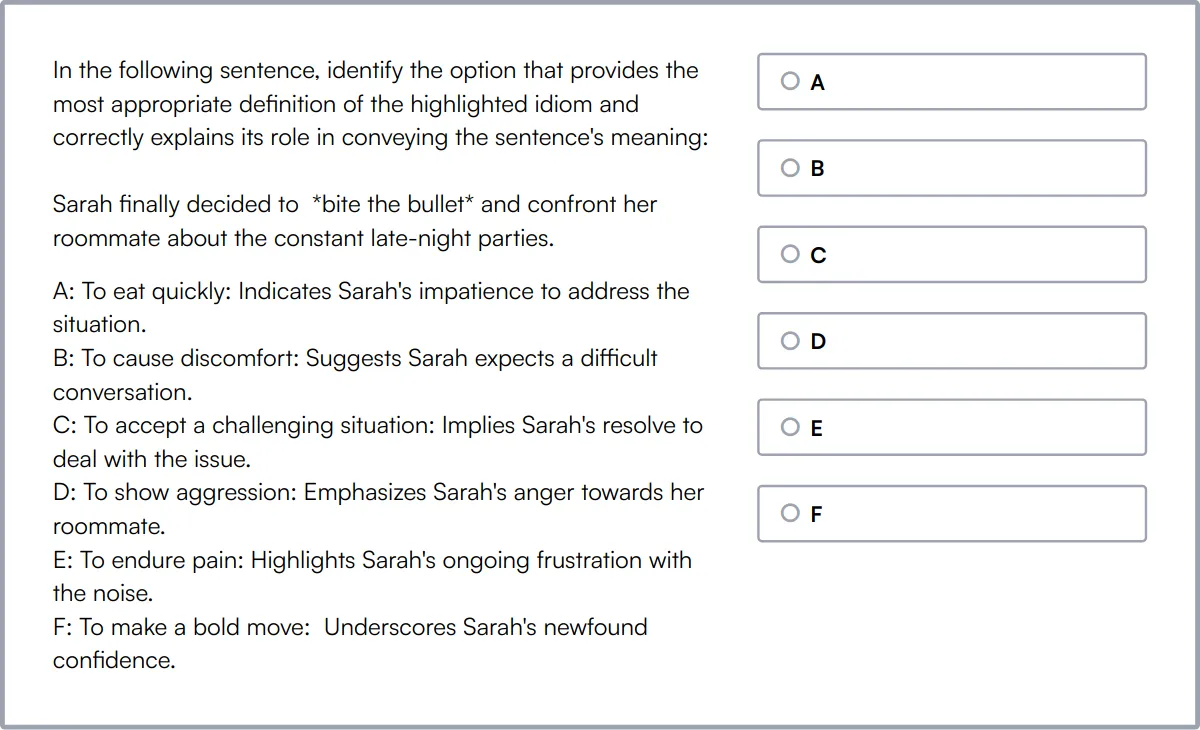
Summary: The 9 key Incident Manager skills and how to test for them
| Incident Manager skill | How to assess them |
|---|---|
| 1. Incident Analysis | Evaluate how effectively a candidate identifies and understands incident details. |
| 2. Problem Solving | Assess ability to devise solutions under pressure. |
| 3. Communication | Check clarity, effectiveness, and adaptability in verbal and written forms. |
| 4. Technical Knowledge | Test candidate's understanding of relevant technologies and tools. |
| 5. Prioritization | Observe decision-making in handling competing deadlines and tasks. |
| 6. Documentation | Review quality and clarity of written records and reports. |
| 7. Stress Management | Simulate high-pressure scenarios to observe coping mechanisms. |
| 8. Collaboration | Examine how well a candidate works within team settings. |
| 9. Monitoring Tools | Test proficiency with specific industry-standard monitoring software. |
Site Reliability Test
Incident Manager skills FAQs
What are the key skills required for an Incident Manager?
Incident Managers need a mix of technical and soft skills including incident analysis, problem solving, communication, technical knowledge, and stress management. They must also be adept at prioritization, documentation, and collaboration.
How can you assess problem-solving skills in Incident Managers?
To assess problem-solving skills, present candidates with hypothetical incident scenarios and ask them to outline their approach. Evaluate their ability to analyze the situation, consider multiple solutions, and select the most effective one.
Why is communication important for an Incident Manager?
Effective communication ensures that all stakeholders are informed about incident status, actions taken, and resolution plans. It helps in managing expectations and facilitates smoother coordination among team members.
What technical knowledge should an Incident Manager possess?
An Incident Manager should understand IT infrastructure, software systems, and cybersecurity fundamentals. Knowledge of monitoring tools and automation is also important to effectively manage and resolve incidents.
How do monitoring tools enhance an Incident Manager's effectiveness?
Monitoring tools help in early detection of incidents, tracking their progress, and analyzing post-incident data. This enables Incident Managers to quickly respond to issues and prevent future occurrences.
What role does stress management play in incident management?
Stress management is crucial as Incident Managers often deal with high-pressure situations. Being able to manage stress helps maintain clear thinking and effective decision-making during critical incidents.
How important is vendor management in the Incident Manager role?
Vendor management is important for ensuring that third-party services meet the organization's needs during incidents. It involves negotiating service levels, managing relationships, and coordinating with vendors during crises.
Can you explain the importance of risk assessment in incident management?
Risk assessment helps in identifying potential threats and vulnerabilities that could lead to incidents. By understanding these risks, Incident Managers can implement strategies to mitigate them and reduce the impact on the organization.
Assess and hire the best Incident Managers with Adaface
Assessing and finding the best Incident Manager is quick and easy when you use talent assessments. You can check out our product tour, sign up for our free plan to see talent assessments in action or view the demo here:

40 min skill tests.
No trick questions.
Accurate shortlisting.
We make it easy for you to find the best candidates in your pipeline with a 40 min skills test.
Try for freeRelated posts
Free resources



